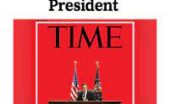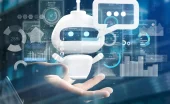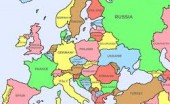Johannah Bernstein post: "eternally proud of my father’s extraordinary aeronautical engineering. legacy. here is a photo of the Canadair Water…
Wednesday Night Salon #1352: The Perils of Dumb Democracy
Written by Diana Thebaud Nicholson // January 30, 2008 // Kimon Valskakis, People Meta, Reports, Wednesday Nights Meta // Comments Off on Wednesday Night Salon #1352: The Perils of Dumb Democracy
Despite fearsome weather conditions a loyal and enthusiastic band gathered for an unusual evening in that discussion was largely limited to Democracy & Governance and the controversy over the AECL Chalk River shutdown, the subsequent firing of Linda Keen and her testimony in front of the Parliamentary committee.
“The Perils of Dumb Democracy”
Although we may accept, along with Winston Churchill that democracy is the least bad of all systems of government, this does not mean that we should be held to all of the mantras that surround the concept.
Two pillars of the Global Governance Group-New School of Athens are the effectiveness of governance and the legitimisation of governance and thus, democracy.
The danger of dumb democracy is that if we do not take care, dumb democracy leads back to dictatorship. Democracy has been tried many times and almost as frequently rejected. In defining dumb democracy, there are five myths:
- The People can do no wrong, which implies the assumption that a 50%+1 majority is always right. Generally majorities tend to think short term and in today’s instant communications environment, the People may well reverse themselves the next day, thus losing credibility. After all, The People are people and they can make mistakes.
- Direct Democracy is always better than representative democracy. Direct democracy has a number of pitfalls including the dangers of an uninformed electorate.It can be argued that it is better to elect representatives for a given term and if not satisfactory, they can be turned out of office. (An important point was made that elected representatives must have the ability to make unpopular decisions that can benefit longer-term issues, thus the need to avoid the “instant recall” powers of the electorate as in practice in California.)
- Democracy trumps all other social goals. This has been disproved by a number of countries that have flirted with democracy before adopting other forms of government to ensure security and societal goals.
- Democratic countries will never go to war against each other. This myth is easily debunked by historical examples – some democracies have been imperialistic.
- National democracy automatically leads to global democracy – even were all the countries of the world true democracies, global democracy would be undercut in international bodies through the differentiation of those countries in size, economic importance, etc. (At this time of election fever in the United States, it is appropriate to mention that there are those who believe that because of the far-reaching influence of that country, the President should be elected globally, rather than only by citizens of the country.)
- “Bubbles” of democracy – a new addition to the list that will be further elaborated, but refers to those individuals who rise to leadership despite an absence of ability (not to be equated with intelligence)
It must be remembered that Plato was very dubious about democracy; in his Republic, he made the case that the best system of government was that of a philosopher-king. (But what guarantee is there that all kings will be philosophers?)
‘Smart’ (sustainable) democracy implies that we accept that in many situations democratic principles are not the best solution. We need to refine the concept of democracy to make it suitable for the 21st century and the kind of inter-generational challenges (climate change, pandemics…) that we must meet wherein decisions made today may have impact 150-200 years from now.
At some point we need authoritarian rule, but we cannot institutionalise it. Most important, there is a need to introduce a certain cultural and social relativity into the debate. One element is the concept of kinship (tribalism) that in some countries is more powerful than allegiance to the state. In Asian cultures it is consensus that is an underlying and very nuanced basis for democracy. In UN processes, where decisions must be based on consensus, in effect, a single country may have a veto, whereas in an African village, where decisions are made by a council of elders, consensus must involve compromise, which in turn implies a certain confrontation.
Random considerations
In a 1950s novel “In the Wet“, Neville Shute proposed a new voting system that allocated multiple votes to an individual who can contribute most to society. Possibly this is a solution to some of the issues of democracy?
There may be some situations that require a ‘Wall’ to separate divided communities until they gradually come to a recognition of communal interest.
We must consider the imposition of artificial borders by the Treaty of Berlin and the Treaty of Versailles – borders that took no account of historic tribal lands and communities, but only of geographic factors. How to un-do the damage inflicted by separating tribal communities by national borders?
The population of some countries – like some diners in restaurants – prefer a table d’hôte to an à la carte form of government, in other words, they prefer to operate within a specific framework.
There is a perception that there is no class system in North America, but one does exist; it is very much who knows who.
In certain parts of the world, democracy is a veneer and bears no relation to democracy as we understand it, based on the Athenian premise that people will take intelligent, considered decisions that are not based on ethnicity and other ‘local’ environments.
In certain contexts (Germany in the1930s and Algeria more recently), democracy is almost self-defeating.
An example of irresponsible democracy was the referendum on the EU Constitution where people were given a yes-no vote on a document that was 160 pages long and to understand it, you needed three Ph.D.s People voted on the document based on a single point.
Democracy is often a requirement of major lending institutions (World Bank, IMF), but a number of developing nations have learned that they may have the veneer of democracy and at the same time, manipulate votes (Kenya being a recent example).
While a better-educated population is more likely to understand the need for short-term pain for long-term gain, there is also the risk that with education comes a tendency to question authority.
The role of the media in creating the myth of a political leader (sometimes a ‘bubble’) must never be underestimated.
The AECL/Chalk River/Canadian Nuclear Safety Commission
It would appear that there was a power struggle between two agencies (one operating and the other regulatory) that reached a deadlock and the government stepped in and broke the deadlock. The isotopes were in effect a side issue and related only to the question of whether or not contracts (not lives) might be lost. The debate revolves around the fact that the Chalk River reactor, shut down for a few days routine maintenance at the end of November, stayed down for almost a month after the CNSC discovered it had been operating for 17 months without an extra, earthquake-resistant, back-up power system hooked up to two cooling pumps that help keep the reactor core from melting down. The operating license was conditional on the operationalization of the two pumps.
Because of certain weaknesses in the overall CANDU project, including problems of public perception, the AECL has been underfunded for some 30 years. Canadian politicians have neither the courage to shut down the project, nor to spend the dollars to keep the system going. We now have an isotope-producing nuclear reactor that is eight years behind its cycle; it is even unlikely that Ontario will purchase reactors from AECL. One solution is that Canada re-think the program, team up with France to share research on the fast breeder reactors that are leading the world.
Another consideration is the interest shown by several companies (AREVA, GE, Westinghouse) in buying AECL or a share, because it has a cadre of people who are skilled in the nuclear power industry. Right now, there is a shortage of people capable of building nuclear reactors on time and on budget.
With respect to the firing of Linda Keen, it is suggested that the Harper government has acted against the system of checks and balances that are designed to protect the public in Canada. Others believe that Linda Keen was involved in a power struggle that she lost.
Unbeknownst to most of those around the Wednesday Night table, there exists a document with the imposing title of A Framework for the Application of Precaution in Science-based Decision Making about Risk which states that the government will be guided by society’s chosen level of acceptance of risk – begging the question of how government ascertains society’s sentiments on the topic. This would lead one to believe that the government acted correctly on the Chalk River file, by ruling on a situation in which Ms Keen had no authority to act outside her mandate.
While this brings us back to the question of whether in a democracy certain authorities (regulatory agencies such as the FDA and FAA in the U.S.) should be beyond the will of the People (Parliament/Congress), it also underlines that in a case where the mandate of the regulator does not include certain actions, then the representatives of the People must act on their behalf.
The U.S. Presidential campaign
In the wake of the South Carolina and Florida primaries and leading up to next week’s Super Tuesday, there were a number of comments including at least one complaint that it is unclear what Obama stands for, other than Change. It was pointed out that while he obviously participates actively in crafting his speeches, his three speechwriters are young – the oldest is 30 and this is something to bear in mind when listening to him ( Ted Sorensen was 32 when he wrote JFK’s Inaugural Address and had been with JFK since he was 25).
[Editor’s note: We were intrigued to discover the following comment from New York magazine: “Much has been made of Barack Obama’s speech-making capabilities in the last couple of weeks, and Hillary Clinton has even been accused by some people of cribbing some of his phrases. But is it is possible that Obama himself borrowed one of his signature lines, from a most unlikely source? “I tuned out the NH debate the other night to watch Man of the Year, in which Robin Williams plays a comedian who gets ‘elected’ President,” one reader commented on John Heilmann’s piece about Obama in last week’s New York. One of Williams’s speeches in the film, he noticed, was strikingly similar to one Obama gave in an ad in Iowa: “We are not a nation of red states or of blue states; we are the United States of America.” So we got a copy of both speeches, played them one after the other, and, well, what do you know? Now, we’re not accusing anyone of plagiarism: Like “I’m a uniter, not a divider” before it, it’s a pretty facile construction, one that could have easily just, you know, seeped in. We also recently watched the film and were struck by the same similarities]
THE PROLOGUE
Having all been on our best – and most diplomatic – behavior last Wednesday, we can now revert to type, indulging in some vigorous debate of a number of items that were not on last week’s agenda.
But before we do, on behalf of Holly Jonas, we would like to call to your attention a special Valentine’s Day Fundraiser for opera lovers: La Scena Musicale takes you to the opera Barber of Seville. This year, La Scena Musicale’s annual Valentine’s Day Fundraising activity is an outing on Thursday, February 14 to the Opéra de Montréal’s performance of Rossini’s Barber of Seville, a story of young love overcoming adversity. Included in this package will be a gift bag containing a recording of Rossini’s opera.
For more information: English and/or français or contact Holly Jonas
Now, back to work. There are the Democrats’ results in South Carolina, and the Republicans’ in Florida. As we write, we are hoping and praying that, as seems likely, Florida will put an end to the Giuliani campaign. There’s the impact of the endorsement of Obama by Senator Ted Kennedy , not to mention Caroline and Representative Patrick Kennedy.These certainly trump endorsements of Hillary by ‘minor’ Kennedys. [We apologize for this remark; it was written before we learned that Kathleen, Robert F. Jr. and Kerry Kennedy had endorsed Hillary Clinton in the LA Times – we certainly do not consider them ‘minor’ Kennedys]
The State of the Union Address received scant coverage in comparison to the Democrats, but President Bush did maintain his cheerleading for the Surge in Iraq. (On that topic, how many saw the extraordinary interview on “Sixty Minutes” with the FBI agent who interrogated Saddam Hussein?)
The other theme of the State of the Union (SoU) was a plea for bipartisan support of the Economic Stimulus package — we look forward to some critical analysis of the proposed package. [Update 30 Jan: Fed Lowers Rate to 3% as U.S. Expansion Falters (Bloomberg) — The Federal Reserve lowered its benchmark interest rate by half a percentage point to 3 percent, the second cut in as many weeks, to prevent the U.S. economy from sinking into a recession.]
We would also add a couple of footnotes regarding the SoU. The passages on energy security, including: “We must continue changing the way America generates electric power, by even greater use of clean coal technology, solar and wind energy, and clean, safe nuclear power. We need to press on with battery research for plug-in and hybrid vehicles, and expand the use of clean diesel vehicles and biodiesel fuel. We must continue investing in new methods of producing ethanol — using everything from wood chips to grasses, to agricultural wastes.” — Ah yes, but then the other shoe dropped — “as we continue to diversify our fuel supply, we must step up domestic oil production in environmentally sensitive ways.”. And now for the sound of violins: “these technologies will help us be better stewards of the environment, and they will help us to confront the serious challenge of global climate change.”
All of which brings us in turn to matters economic and the World Economic Forum (Davos) meeting of last week Although we are told that economic uncertainty would dominate the meeting, as it grows ever-more expansive, so too does the agenda, from terrorism to sovereign wealth funds, to Bill Gates’ new farming initiative, leading us to wonder what actually is accomplished?
With the return of Parliament from aptly-named recess, a cloud of general nastiness has again settled over Ottawa, whether over the detainees in Afghanistan, or the firing of Linda Keen. There is also a general unease about sovereign wealth funds. Should we worry that a new study by the Conference Board of Canada, “’Hollowing Out’—Myth and Reality: Corporate Takeovers in an Age of Transformation”, found that Canadian companies were sold at an increasing rate from 2005 to 2007? Minister Flaherty does not appear to share the malaise about sovereign wealth funds. Fresh back from Davos and Abu Dhabi where he met with the Abu Dhabi Investment Authority, he is quoted “There is no doubt that sovereign wealth funds provide numerous economic benefits not only for the country of origin but for the countries they invest in.”
Most of the above subject matter leads us quite easily to The Perils of Dumb Democracy , a paper presented by Kimon Valaskakis at a symposium organized last April at the Widener University School of Law (see below) and which has recently been published. Kimon will be joining us this Wednesday to talk about his paper, global governance, and the many current events that could easily be filed under the title of “Dumb Democracy”.
We look forward to a gathering of smart democrats prepared for any and all intellectual challenges.
CONSIDERING GLOBAL DEMOCRACY AN INTRODUCTION TO THE SYMPOSIUM:
ENVISIONING A MORE DEMOCRATIC GLOBAL SYSTEM
ANDREW STRAUSS
Beginning in the early 1990’s with the fall of the Berlin Wall, the international system’s lack of transparency, accountability, and citizen inclusiveness became a major political issue. By the time of the dramatic protest against the World Trade Organization in Seattle, this global democratic deficit had generally come to be considered one of the primary problems associated with globalization. Paradoxically, however, in these many years of concern, there has been little scholarly discussion offering concrete suggestions for remedying the problem.
In the hopes of furthering such a discussion, fifteen prominent men and women from around the world gathered at Widener University School of Law in April 2006 to consider what could be done to make the global system more democratic. On the table for discussion were political impediments to achieving global democracy as well as specific democratization ideas and proposals. The primary focus of the Symposium, however, was the specific proposal for a popularly elected global parliamentary assembly.
The Perils of Dumb Democracy — New School of Athens President, Ambassador Kimon Valaskakis, furthers this theme with his own analysis of what practices are consistent with creating a successful national democracy before similarly turning to how such practices can be applied to global democracy. Kimon’s paper



